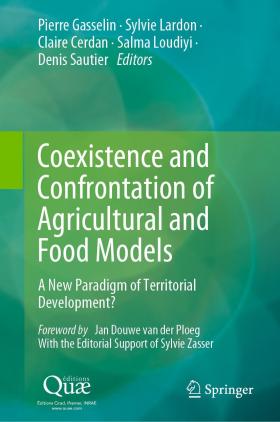Society and regional strategies Reading time 1 min
Coexistence and Confrontation of Agricultural and Food Models
Published on 20 March 2023


This book analyses situations of coexistence and confrontation of agricultural and food models according to four major dimensions of territorial development: the tension between specialisation and diversification; innovation; adaptation; and food transition.
New agricultural and food models are being deployed in territories around the world in response to criticisms of the old forms of agriculture and food production, and in order to meet new challenges. These models embody archetypes of the observed diversity, actors’ projects or new norms.
A number of conceptual studies and case studies from France and other countries allow us to understand the interactions between these models (confrontation, complementarity, co-evolution, hybridisation, etc.), taking us well beyond the characterisation of their diversity and the evaluation of their relative performances. The coexistence and confrontation of these models build up their capacity for radical change.
The book asks original questions about the analytical framework, its methodological challenges and the expected outcomes for the support of agricultural and food development in rural and urban territories. It is intended for researchers, teachers, students and professionals interested in territorial development.
Gasselin P., Lardon S., Cerdan C., Loudiyi S., Sautier D. (eds.) (2023). Coexistence and confrontation of agricultural and food models: a new paradigm of territorial development?. Springer, 315 p. ISBN 978-94-024-2177-4. https://doi.org/10.1007/978-94-024-2178-1
ABOUT THE EDITORS
- Pierre Gasselin, geographer at INRAE (Innovation joint research unit, Montpellier), conducts research in France and Latin America on the transformation of farmers’ activities, on the conditions conducive to their territorial integration, and on providing support to them.
- Sylvie Lardon, geographer at INRAE and AgroParisTech (Territoires joint research unit, Clermont-Ferrand), is a specialist in participatory prospective diagnosis. She studies the transformations of rural and urban territories in the Mediterranean region, Argentina and Brazil.
- Claire Cerdan, geographer, researcher at CIRAD (Innovation joint research unit, Réunion), works on localised agrifood systems and the role of territorial resources in the recomposition of territories in Africa and Latin America.
- Salma Loudiyi, geographer, full professor at VetAgro Sup (Territoires joint research unit, Clermont-Ferrand), leads research on the implementation of integrated food policies in France and North America.
- Denis Sautier, economist at CIRAD (Innovation joint research unit, Montpellier), studies localised agrifood systems and place-based labelling in Asia and Africa.
French edition - Webinar Replay (French only)
